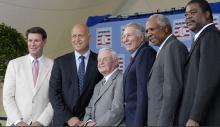IN SEATTLE when we think of this inkblot test, we think of exactly this kind of thing ... prior years' scoffing against Halman in CF, against Peguero and Mike Wilson and Mike Carp in LF, against Ackley at 2B, and so forth...It illustrates the philosophical divide nicely...

.
=== Inkblot Test, Dept. ===
Who would you prefer at 3B: Figgins or Kennedy? Our reactions tell us a lot about our baseball prejudices (mine too).
SSI bemusedly offers the suggestion that, very loosely speaking, we could argue for a 1972 third baseman in favor of a 2011 third baseman -- and, though slip-sliding back to a retrograde past, believe that we have just now discovered something new under the sun. ;- )
Hey, guys. Every 1930's manager who ever selected a fast player in a corner, was endorsing UZR in that case. Managers have (often) gone with the glove man since 1900, right? There's nothing "fresh" about noticing that a ballplayer is a good defender. John McGraw preferred them.
***
In this particular case, the Figgy advocates may be right. Generalizations don't help us decide between specific player-pairs. But let's not call defense and speed the cutting edge. Defense and speed, as primary colors on the pennant canvas, were obsolete a long time ago. The natural selection process has solved this debate for us.
Players are big today. Because big players win more games.
You want sabermetric evidence? It's as simple as two data points: average height and weight today, vs. yesteryear. And knowledge of the self-evident fact that sports progress (say, proven with track times). The macro insights are the most important ones.
Steroid control has reduced weight a bit, you say? The whole syndrome proved that the bigger the player, the more desirable the player.
***
On TV tonight, all three guys were talking about how well Kennedy played 3B down in ST. And that Kennedy could take over Figgins' spot, with Figgins going to super-sub. The TV guys are usually, IMHO, following org directives in such on-air test balloons.
.
=== Weaver On Strategy, Dept. ===
Earl Weaver protested again and again that baseball worked far too hard to ignore a fact right in front of them: that the dominating play in a baseball game is the HR.
We sabermetricians have gotten so wrapped around the axle with sophisticated stats, that we have talked past the grandmasters of the game. There have been managers who cobbled pennant runs with a field full of little fast guys, but it has always been a daily chore for the Go-Go White Sox'ers to grind out 4-3 wins every night.
SSI has protested, on its part, that the 2011 wins were just much too hard with so few homers. You can scratch and claw all you want, but all it takes is one bad play -- say a first-pitch fastball from your closer -- and BOOM there go three hours.
***
We figure, it's all about OBP. Homers don't show up, per se, in OBP or SLG -- and it's very urbane to discount SLG as being worth 0.33 of what OBP is anyway.
But maybe a team with no home runs ---> really does lose ground on OBP too. When has sabermetrics ever even asked the question, "what causes hitters to have bad years?"
In 2010 and April 2011, the Mariners have had all their players hitting bad ... together. Why is that? Perhaps the old-school managers realized that an unscary lineup caused problems all the way around?
Tonight, after Kennedy went yard again, he immediately explained that the whole lineup is swinging well. That's it's much easier to hit when your teammates are making life tough on the pitcher.
For all of Earl's sophistication, he built his offenses on a simple idea. He wanted his teams to be top-3 in the league in home runs. He didn't ask Cal Ripken to play short by accident.
Who knows how many ultra-sophisticated, invisible game factors he "captured" by leading the league in HR's!
.